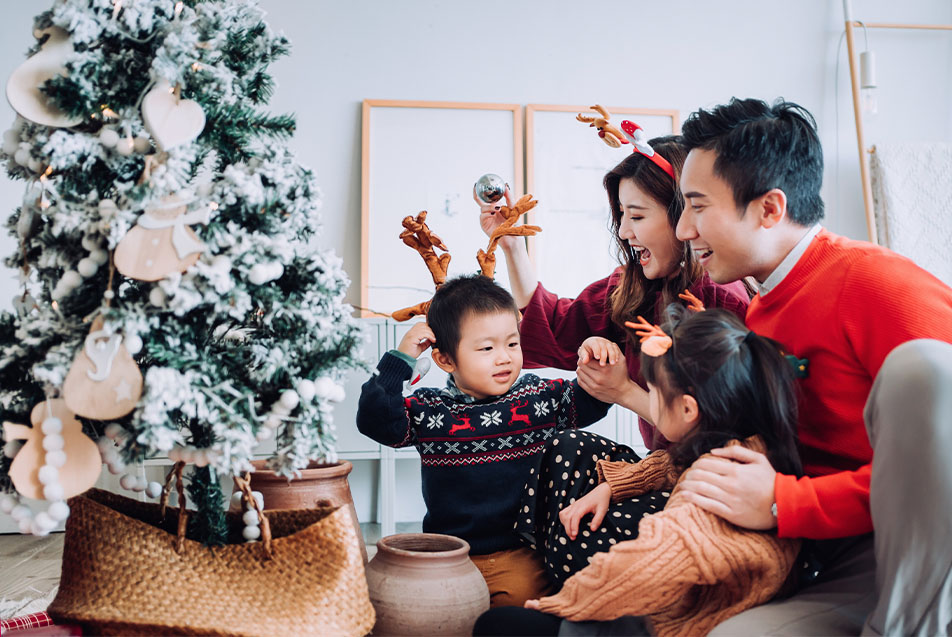
This post was written by Courtney L. Washington, PsyD, CSAYC, HSPP, Parkview Behavioral Health Institute.
“It’s the most wonderful time of the year ...” We all know this familiar tune. While there are joys of the season, and the lights on my Christmas tree bring warmth to the cold and dark nights, the holidays are also stressful and lonely at times. For many, family time can be a treat, but for others spending time with family can bring traumatic memories or past hurtful experiences to the surface. Others have no family at all to rely on. Further compounding the stress of the “most wonderful time of year,” is the pressure to consume material goods at an astronomical rate. All of which serves to distract us from the true meaning of the holidays.
As soon as the calendar flips to November 1, media emphasizes how to communicate love for others through material goods. We are constantly bombarded with messages about what to buy and how much to buy. The image of a brand-new car with a big red bow comes to mind. But what if I can’t afford to give my children or loved ones these material goods? Does this mean that I love them any less?
What the research says
There has been more than 50 years of research regarding the concept of subjective well-being (the clinical term for happiness) and how happiness interacts with materialism, material values and material pursuits. The research is clear. Consumption of material goods has negative impacts on mental health, specifically leading to higher levels of depression and anxiety. Material goods give little to add to our levels of happiness in the long term. This is related to two factors: 1) the concept of the hedonistic treadmill – consuming and obtaining goods only leads us to wanting more and more, and 2) no matter how excited we are about a new material object, this excitement undoubtedly wanes, and we want something new to replace it.
Give a gift that delivers
While money spent on material goods does little to improve people’s subjective level of happiness, money spent on experiences and pursuits of personal growth consistently have a greater and more long-standing impact. This is likely due to the boost in mood that people get when recalling memories of concerts, movies and other fun things they have done with people. The other benefit of spending our money on activities, is that we often do these things with people we love, which increases our intimacy and connection to them through shared experiences.
Some ideas of holiday gifts that aren’t things:
- Concert/musical/theater tickets
- Online classes
- Travel
- Dining out
- Digital subscriptions
- Self-care day
- Board games
Navigating family dynamics
While our loved ones can bring joy, many struggle with living in more difficult family dynamics. For these individuals and even for others who enjoy their family, the holidays can feel like a lot of family time. What is Aunt Bethany going to say about my life choices? What will Uncle Louis ruin in my house? We all have those relatives, and it’s important to acknowledge the challenges that this can bring.
Remember, if you have done a lot of personal work and growth, families and systems often struggle with these changes. Family systems like to maintain a homeostasis or equilibrium that maintains functioning roles no matter how unhealthy.
A few things to keep in mind in the face of these challenges:
- You are no longer the same person you were as a child. You have an adult brain and adult coping mechanisms. Although you may be pulled to respond in a similar manner that leads to the same debate with your brother every year, know that you can respond differently. Changing these reactions even slightly can grossly change the outcome of the interaction.
- Set and maintain your boundaries. If you know that every time your dad starts to lecture you get annoyed, walk away. Leave the room. Step outside. It is okay and healthy to know what your limits are. You are responsible for taking care of yourself. If this means upsetting the norms of your family system, tough cookies.
- Manage your expectations. If your cousin is always crude and you leave the family celebration every year disappointed, don’t expect things to magically be different. The thing that will lead to a Christmas miracle is responding differently to the same situation. Prepare for what you are going into and cope ahead.
While the holiday season can bring warmth and joy, it can also be challenging, especially for those who do not have financial means or family support. During this time of year, it’s important for us to remember what the season is truly about. Throughout nature, winter is a time of rest. A time of going within ourselves and reflecting on the year that has passed and the growth that has occurred. It’s a time of introspection, when we take stock of what matters most in our lives and lean into these people and experiences. A time when we can focus our energy on valuing humanity, kindness and peace. Holding onto these values allows us to get lost in the child-like marvel of the beautiful light displays without being distracted by the avoidance and noise of the holiday season.



